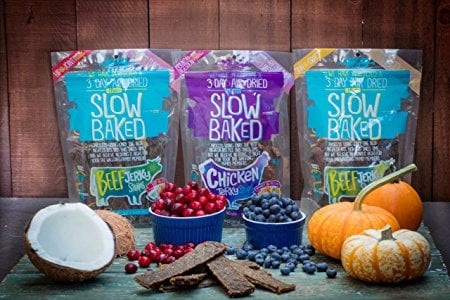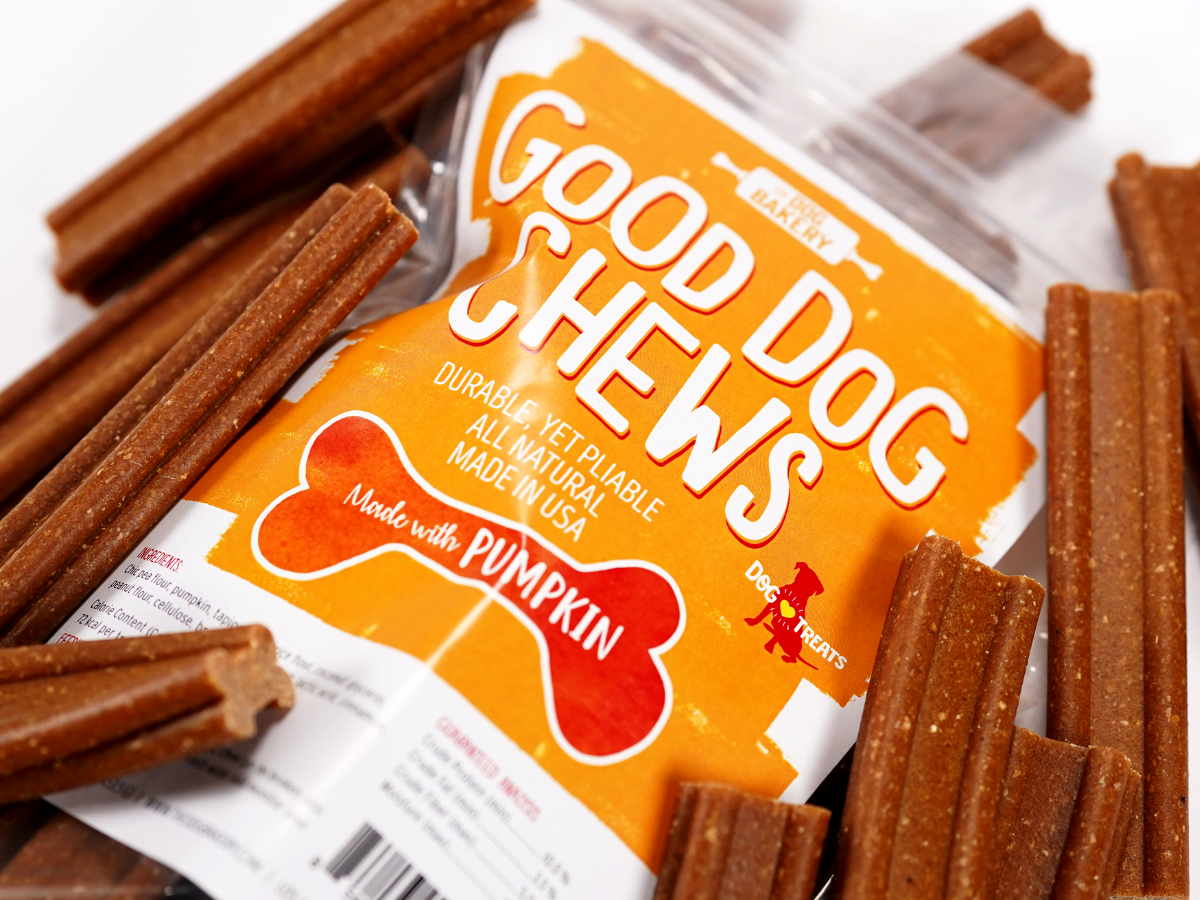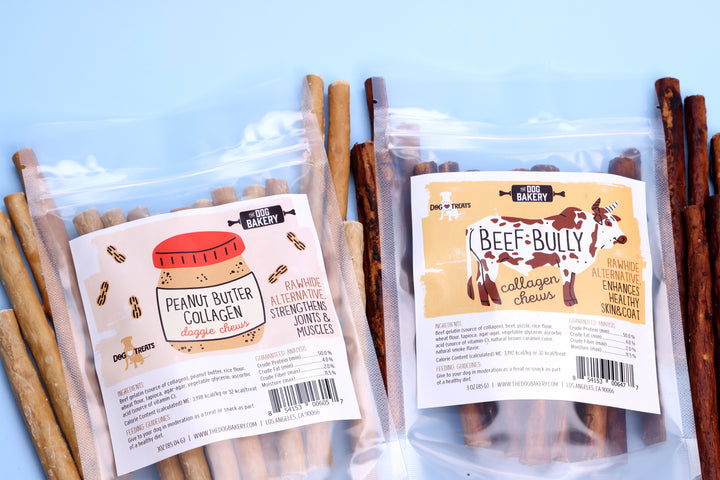Expert-Approved Home Cooked Meals for Dogs

Feeding your dog can feel like a mystery sometimes—after all, it’s hard to say exactly what’s in commercial kibbles and wet foods just by looking at them. Dog food tastes, well, like dog food, so it’s not surprising that some dogs won’t eat the stuff at all. For many dogs, commercial foods just don’t give them the nutrition they crave, and can’t support high-energy, playful pups or dogs with unique dietary needs.
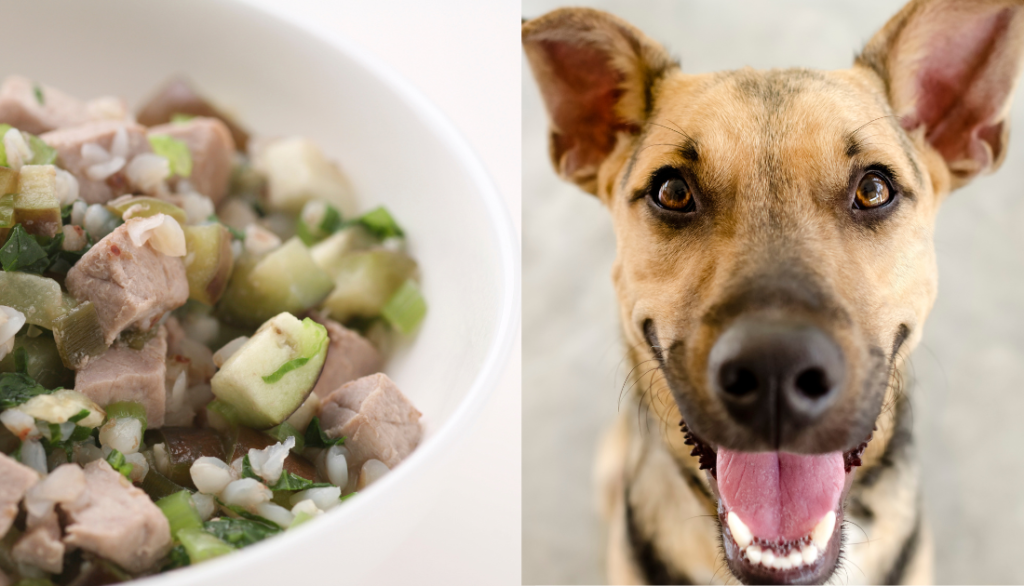
Instead of relying on commercial pet food brands to handle feeding your dog, take control of your dog’s diet by making home-cooked meals using balanced dog-friendly recipes. Made with human-grade ingredients and with love by you, we promise you’re about to cook the best meal your dog has ever eaten.
Why Feed Your Dog Home-Cooked Meals?
The benefits of homemade dog food are most obvious when compared to commercial store-bought dog food. Homemade dog food uses fresher ingredients, fewer preservatives, a larger variety of ingredients, and can be tailored to the exact needs of your pet. By making homemade dog food, you have complete control over what they eat and can ensure they get precise nutrients for their unique needs.
Cost of Home-Cooked Dog Food vs. Store-Bought
A homemade dog food recipe can be more or less expensive depending on which brand of dog food you feed your dog. One is not necessarily cheaper than the other because of too many factors, but in most cases, it is safe to assume that homemade dog food will be more expensive than store-bought kibble. However, if you feed air-dried, freeze-dried, fresh-frozen, or raw dog food, homemade may be less expensive.
Mistakes to Avoid When Cooking Meals for Dogs
The biggest and most serious mistake pet owners make when preparing homemade dog food is neglecting to learn about nutritional balance. Dogs need specific proportions of protein, fat, fiber, and carbohydrates to stay healthy in addition to a wide range of vitamins and nutrients. The easiest way to avoid undernourishing your dog is to consult with a vet or canine nutritionist.
Adding multi-vitamins and dietary supplements to your dog’s diet can also help to balance your pup’s diet.
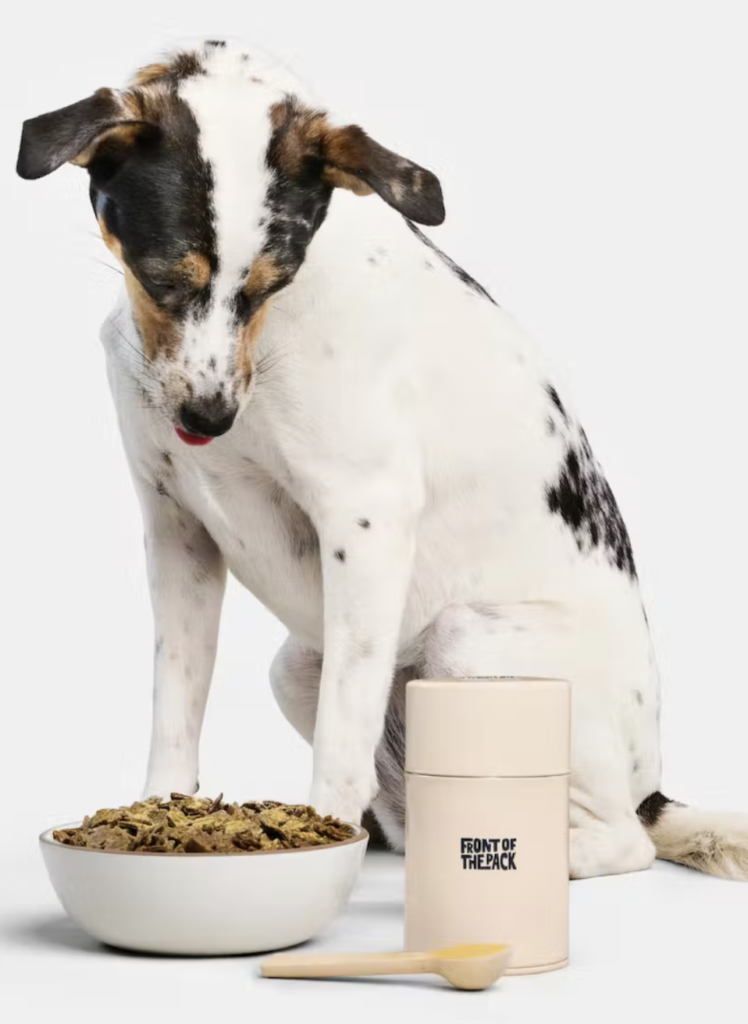
Tips for How To Prepare Home-Cooked Meals for Dogs
As you start learning how to cook for your dog, recipes can seem a little confusing or overwhelming. To help you feel more confident and prepared to dive into home cooking for dogs, we’ve gathered a few tips for success.
- Start by talking with a vet or veterinary nutritionist—they can help to formulate a balanced dog meal plan.
- Use a recipe balancer when making new recipes to eliminate the math and guesswork of creating a balanced formula.
- Switch up ingredients regularly to keep things interesting for you and your dog, and to give them a wide variety of nutrients.
- Keep your kitchen and prep area clean, and try to prevent minging human food with dog food whenever possible.
- Prep food in bulk to save yourself time and money. Pro tip: pre-portion bulk recipes to make mealtimes extra easy.
- Use high-quality ingredients, including lean meats, whole grains, and fresh fruits and vegetables.
- Use the refrigerator to thaw frozen food and for short-term (1-2 days) storage. Freeze food for long-term storage.
Nutritional Supplements
High-quality store-bought dog food is usually made with a combination of whole ingredients and added supplements. Dogs can certainly survive eating homemade dog meal recipes on their own, assuming they’re properly nutritionally balanced. However, adding extra nutrients, meal toppers, and supplements can help your dog really thrive.
Before you add any supplements to your dog’s diet, it’s a good idea to consult with your veterinarian. They will be able to assess your dog’s unique needs and confirm whether or not they will benefit from certain supplements.
Daily All-in-One Supplement
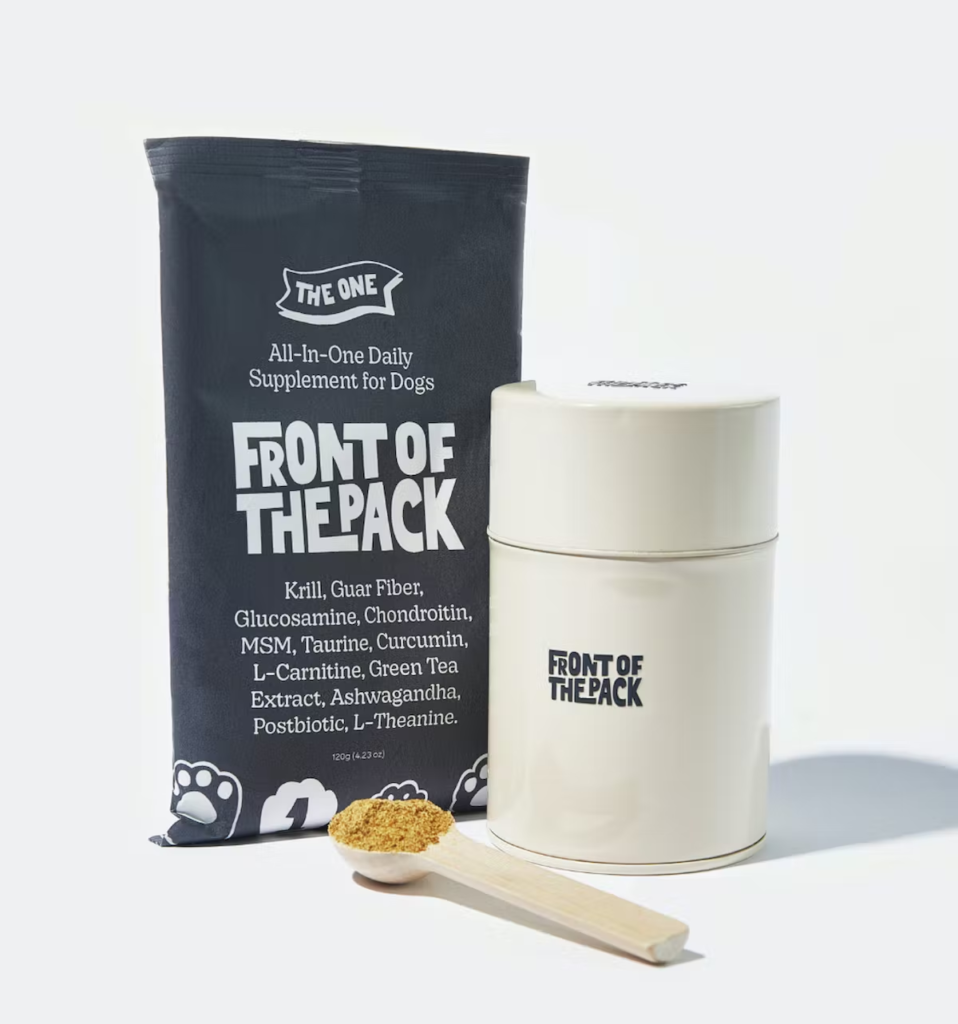
This supplement is designed to target the areas of your dog’s health that aren’t always supported, even with a fully balanced diet. Some of the benefits of adding this powder to your dog’s home-cooked food for dogs recipes include protecting joints, fresher breath, supporting immunity, and many more.
Key Ingredients: Krill, Guar Fiber, Glucosamine, Chondroitin, MSM, Taurine, Curcumin, L-Carnitine, Green Tea Extract, Ashwagandha, Postbiotic, L-Theanine

Omega-3 Fatty Acids: Wild Alaskan Salmon Oil
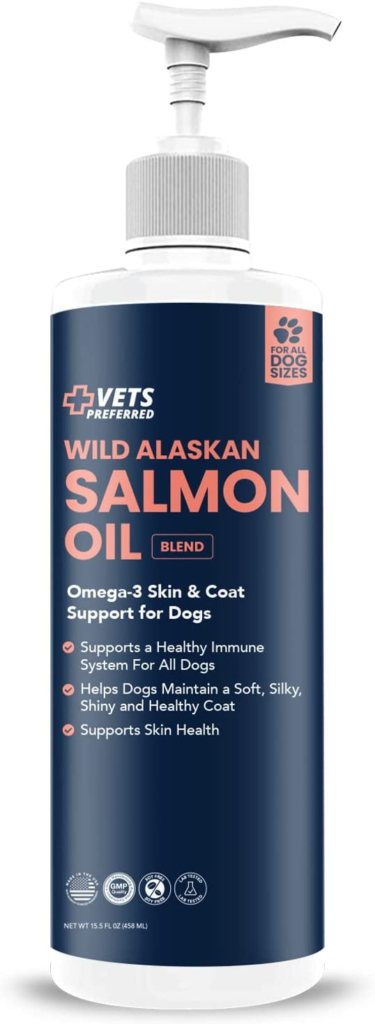
Omega-3 fatty acid supplements are one of the most popular nutrients to add to home-cooked recipes for dogs. Not only are omega-3s super beneficial for canine health they are also much easier and more affordable to add in supplement form. While some whole food recipes for dogs include ingredients rich in omega-3s (e.g. salmon, flaxseed), feeding these ingredients can get expensive.
Adding an omega-3 supplement like this salmon oil from Vets Preferred can help support overall wellness, vision health, skin and coat health, joint function, cognitive health, heart health, and so much more.
Key Ingredients: Salmon Oil, Pollock Fish Oil

Skin & Coat Chews
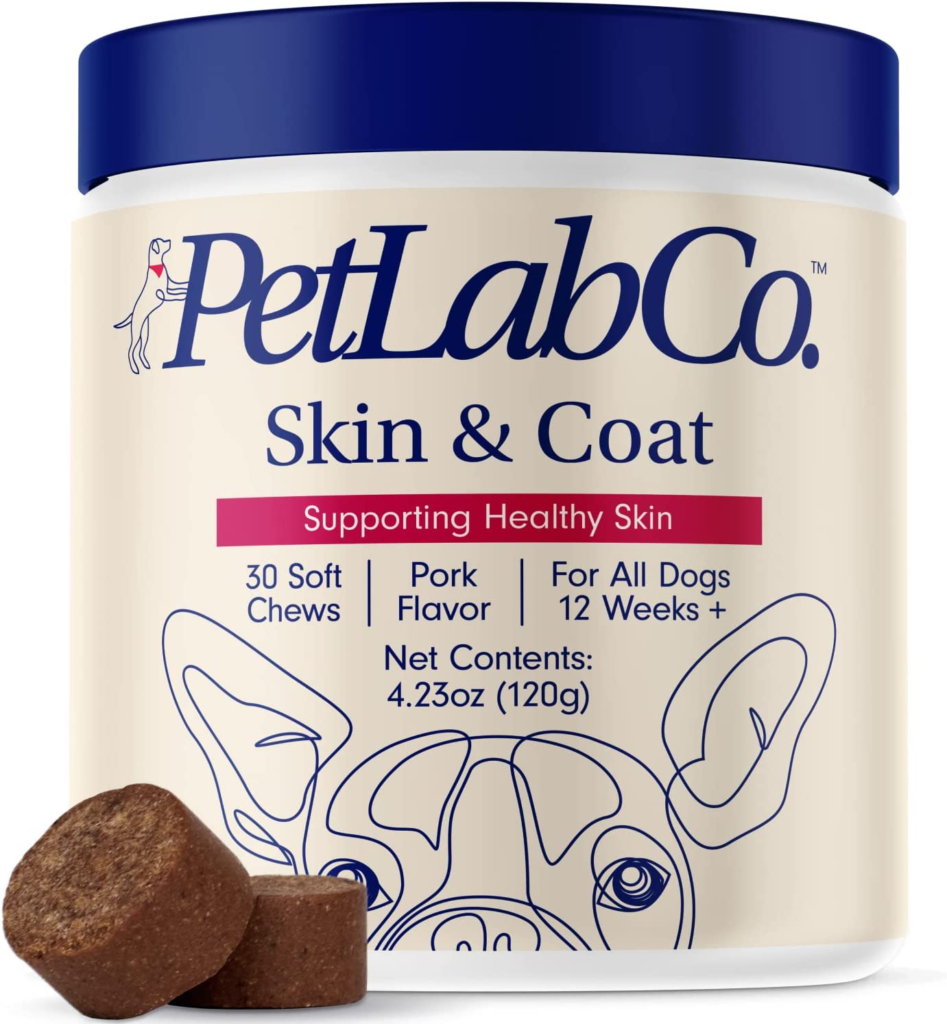
If your dog suffers from itchy skin, dandruff, irritation/skin inflammation, or has dry, dull fur, a skin and coat-specific supplement could be helpful. Developed by PetLab Co., this pork-flavored chew features a blend of hydrating and anti-inflammatory ingredients. PetLab Co. manufactures its supplements entirely in the US, and sources only premium ingredients from local and global producers.
Key Ingredients: Anchovy Oil, Flaxseed Oil, TurmericCurcuma, Apple Cider Vinegar, Vitamin E, Zinc Gluconate, Vitamin C, Biotin

Hip & Joint Support: ActivTreats
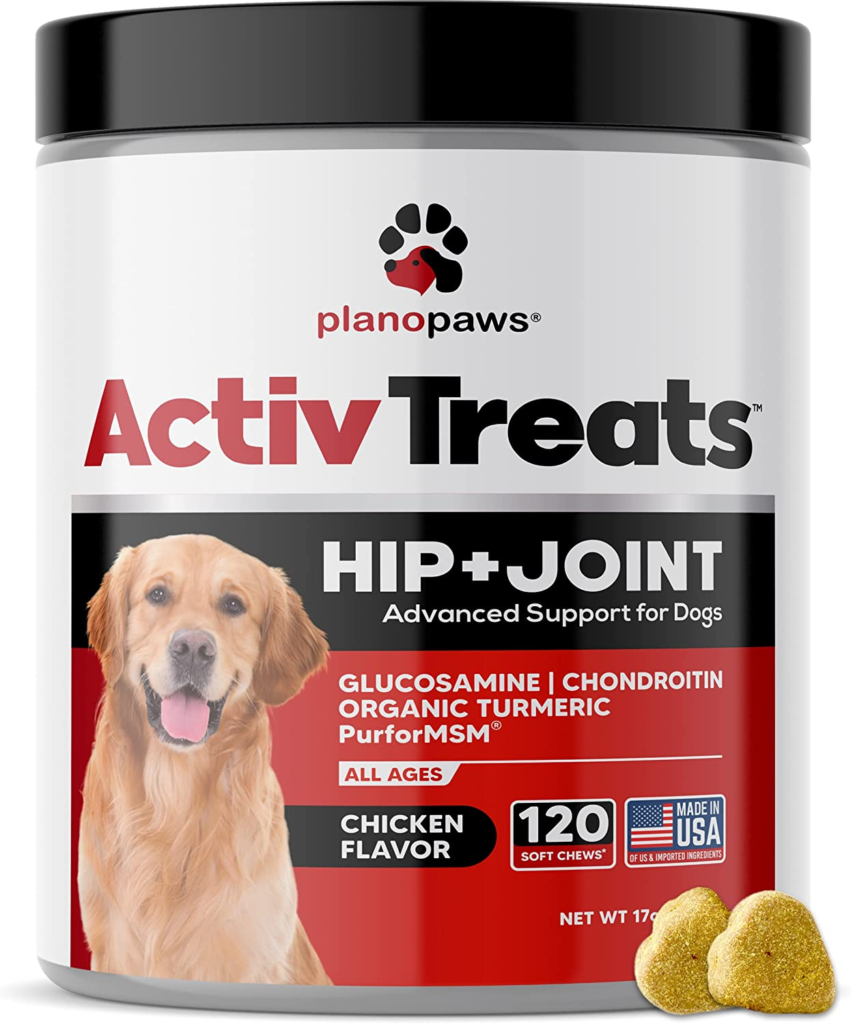
Joint supplements aren’t just for senior dogs—although seniors do benefit from added nutrients! Many dog breeds are prone to hip and joint problems, whether due to size, breeding standards, or genetic abnormalities. Even if your dog doesn’t have issues with their joints, giving them a supplement like ActivTreats Hip + Joint supplement from PlanoPaws can support long-term health, and prevent inflammation and other degenerative joint issues.
Key Ingredients: Glucosamine HCL (from shellfish), Chondroitin, Turmeric, Vitamin C, Vitamin E, Dried Yucca Schidigera, Egg Shell Meal

Probiotic & Prebiotic Supplements
The canine gut—much like the human gut—requires balance to function properly. Probiotics help to promote healthy gut flora that aid in digestion and nutrient absorption, and inhibit the growth of harmful bacteria that can cause discomfort, gas, and more. Prebiotics are basically fuel for the probiotics and help to keep gut flora strong and healthy.
Well Pre+ Probiotics supplement from Honest Paws is an easy, single-serve pre and probiotic supplement designed for dogs of all ages, sizes, and breeds. Great for digestion and nutrient absorption, prebiotics and probiotics can also support immune function and overall wellness. Adding a supplement like this to already healthy home-cooked dog food recipes can help your dog enjoy the full benefits of your hard work and cooking.
Key Ingredients: Chicory Powder (Inulin), DE111, Bifidobacterium animalis llactis (probiotic), Spinach Leaf Extract, Bacillus coagulans (similar to a probiotic), Lactobacillus acidophilus (probiotic)

1. Homemade 4-Protein Dog Dinner Recipe
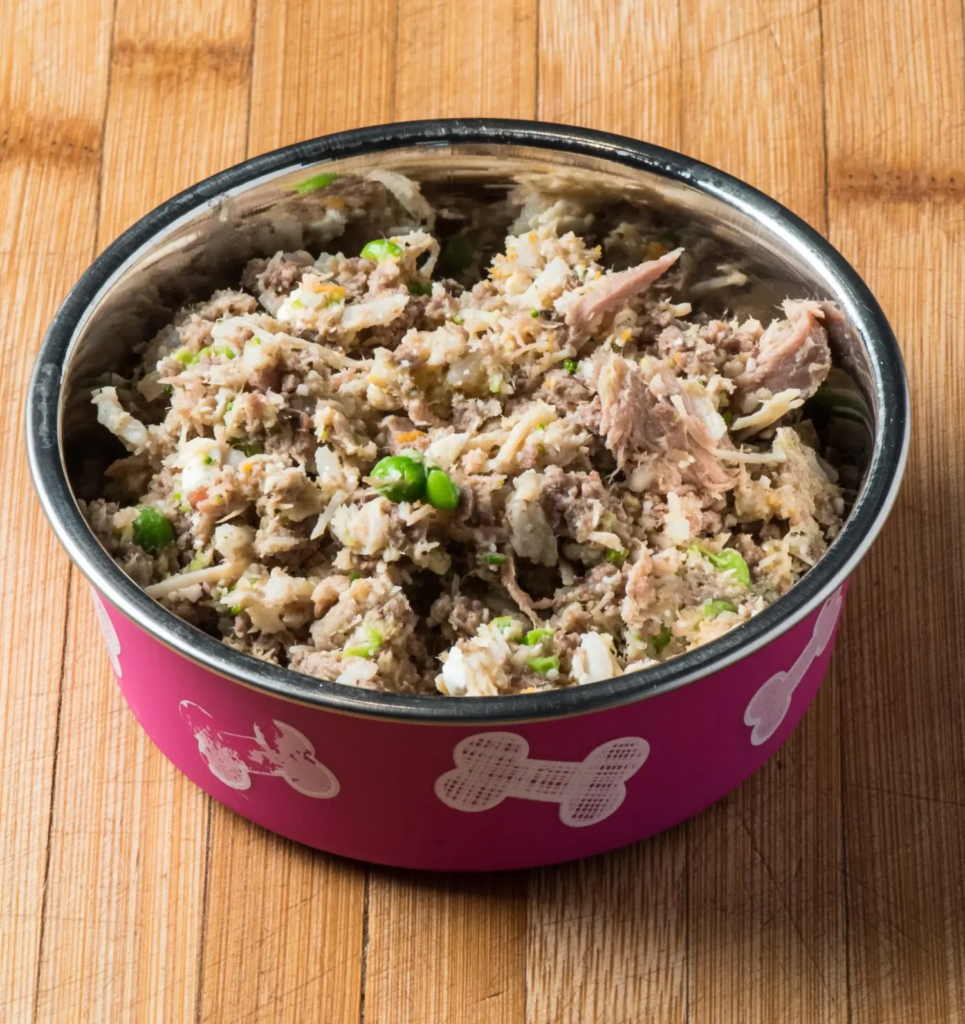
Mixing proteins and giving your dog variety is a great way to ensure their diet is balanced, and they’re getting the wide range of nutrients they need. This recipe from Tasty Low Carb’s Joanie and Chris features not two, not three, but four amazing sources of meat, plus healthy veggies, fruit, and fats!
To make this high-protein all-natural dog food recipe, you’ll need to use a food processor. If you don’t have one, leave out the gizzards and choose an organ meat that is easier to process by hand like chicken liver.
Ingredients
- 1 cup rice
- ½ lbs chicken gizzards
- 3 eggs
- 2 lbs ground beef
- 2 lbs ground turkey
- 6 oz. green peas
- 6 oz. cauliflower
- 6 oz. broccoli
- ½ apple
- 6 oz. sweet potato
- 14 oz. canned tuna in water (unsalted, can substitute with salmon)
- ½ cup cottage cheese
- 3 tablespoons coconut oil
- The One daily supplement, to garnish
Directions
- Cook rice according to label instructions. Set aside to use later.
- Add chicken gizzards and eggs to a second pot, cover with water, and bring to a boil. Boil until the gizzards are cooked through and the eggs are hard-boiled, about 10 minutes.
- In a heavy-bottomed pot combine ground beef and turkey, and cook thoroughly over medium heat until browned. Break apart and mix the meat while stirring. Once cooked, remove from the heat and drain off excess grease.
- In a food processor, combine peas, cauliflower, broccoli, apple, chicken gizzards, and eggs. Process until combined, and you’ve achieved a rough chop.
- Microwave sweet potato until soft, about 3-5 minutes, depending on your microwave.
- Combine all ingredients in a large pot or bowl and mix well.
- To serve, portion, and sprinkle with The One daily supplement.
Important Notes
This recipe yields 48 135-calorie servings. The recipe creator makes this large batch last two weeks for her two 9-pound pups.
2. Homemade Stovetop Dog Food Recipe
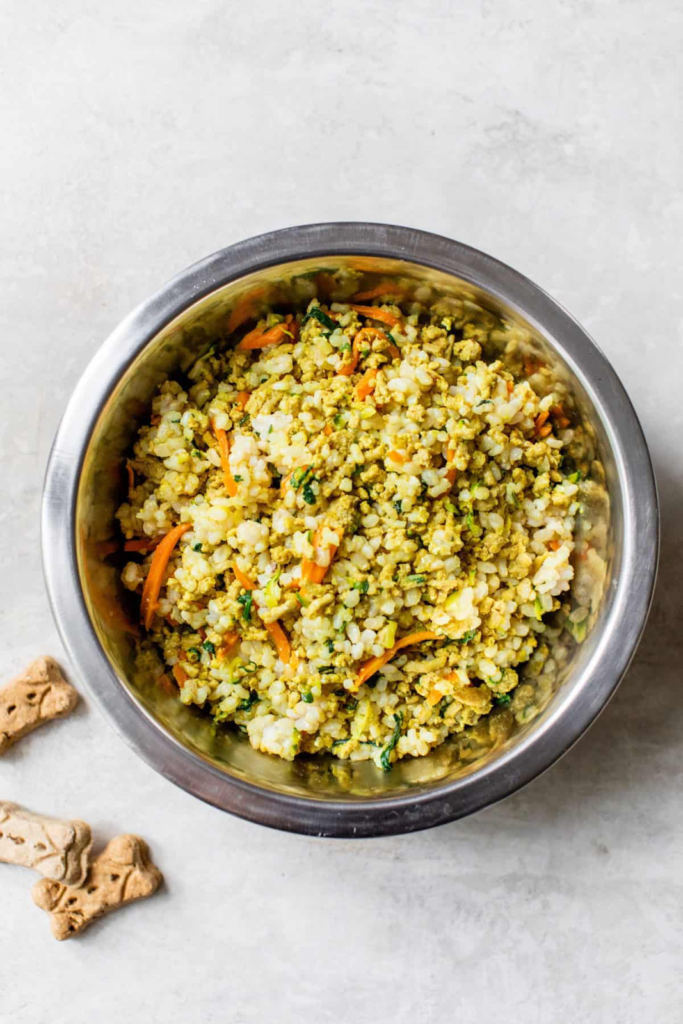
Making home-cooked recipes for dogs doesn’t need to be complicated or involve a bunch of fancy ingredients or tools. Super simple and one of the best dog recipes to make in a pinch, Dani Spies’ recipe for home-cooked dog food is done entirely on the stovetop.
Because the finished texture of this food is a fine crumble, it’s also a good option for dogs who struggle to chew or typically prefer pureed dog food recipes.
Ingredients
- 1 TBSP coconut oil
- 1 lb ground turkey
- 1 zucchini, shredded
- 1 cup finely chopped baby spinach
- 1 cup shredded carrots
- ½ tsp turmeric
- 1 egg (without the shell)
- 3 cups rice (white or brown), cooked
- The One daily supplement, to garnish
Directions
- Add coconut oil to a large skillet over medium-high heat.
- Add the ground turkey to the skillet and sauté until browned, breaking up the turkey as you stir.
- Reduce heat to medium and add zucchini, spinach, carrots, and turmeric. Stir well to incorporate and cook to soften vegetables, about 7 minutes.
- Turn off the heat and instantly add the egg, stirring vigorously to cook the egg using the residual heat.
- Once everything is cooked through, add the already-cooked rice and stir well to combine.
- Cool before serving, and garnish with your dog’s daily dose of The One nutritional supplement.
Important Notes
Once cooked, this recipe yields about 6-7 cups of food. Each cup is approximately 240 calories. The recipe creator serves her 40 lb dog 1 cup twice per day.
Home-Cooked Meals for Dogs FAQ
Was there something we missed? Do you still have nagging questions about making healthy recipes for dogs? Here are a few quick answers to your most pressing questions on dog meal recipes.
What human foods can dogs eat as a meal?
The answer to this depends on what you mean by “human foods.” Dogs shouldn’t eat meals prepared for humans, because they don’t need and can’t tolerate ingredients in the same amounts as we can. For example, dogs need a small amount of sodium for cellular energy, but a serving of salty fries could make them really sick.
This said, dogs naturally eat many of the same foods humans do, and thrive on a diet that is high in animal protein like beef, chicken, fish, and so on. The recipes above all use “human food” ingredients for healthy homemade dog food.
Do dogs need 3 meals a day?
No! Most dog owners like to feed their dogs twice a day at breakfast and dinner. Some—though a bit rare—feed their dogs one big meal a day. In some cases, veterinarians may recommend that you feed your dog multiple small meals a day to prevent stomach and digestive issues, but this isn’t a common feeding schedule for dogs.
What should I include in my dog’s homemade food?
One of the most important things to include in home-cooking recipes for dogs is protein. Dogs are carnivores who require protein derived from animals to thrive, and their diet should reflect this biological need.
What can you not put in homemade dog food?
There are a number of ingredients used in “human cooking” that aren’t safe to include in your dog dinner recipes. Some examples of ingredients that are toxic or dangerous to dogs include:
Avocado
Chilis
Cooked bones
Garlic
Macadamia nuts
Onion
Raisins
Related Articles
- 4 Vet-Approved Homemade Dog Food Recipes
- Salmon Dog Food Recipes You Can Make at Home
- 3 Vegetarian Dog Food Recipes You Can Make At Home
- Easy Recipes for Homemade Dog Food
- Homemade Dog Food Recipes for Senior Dogs

